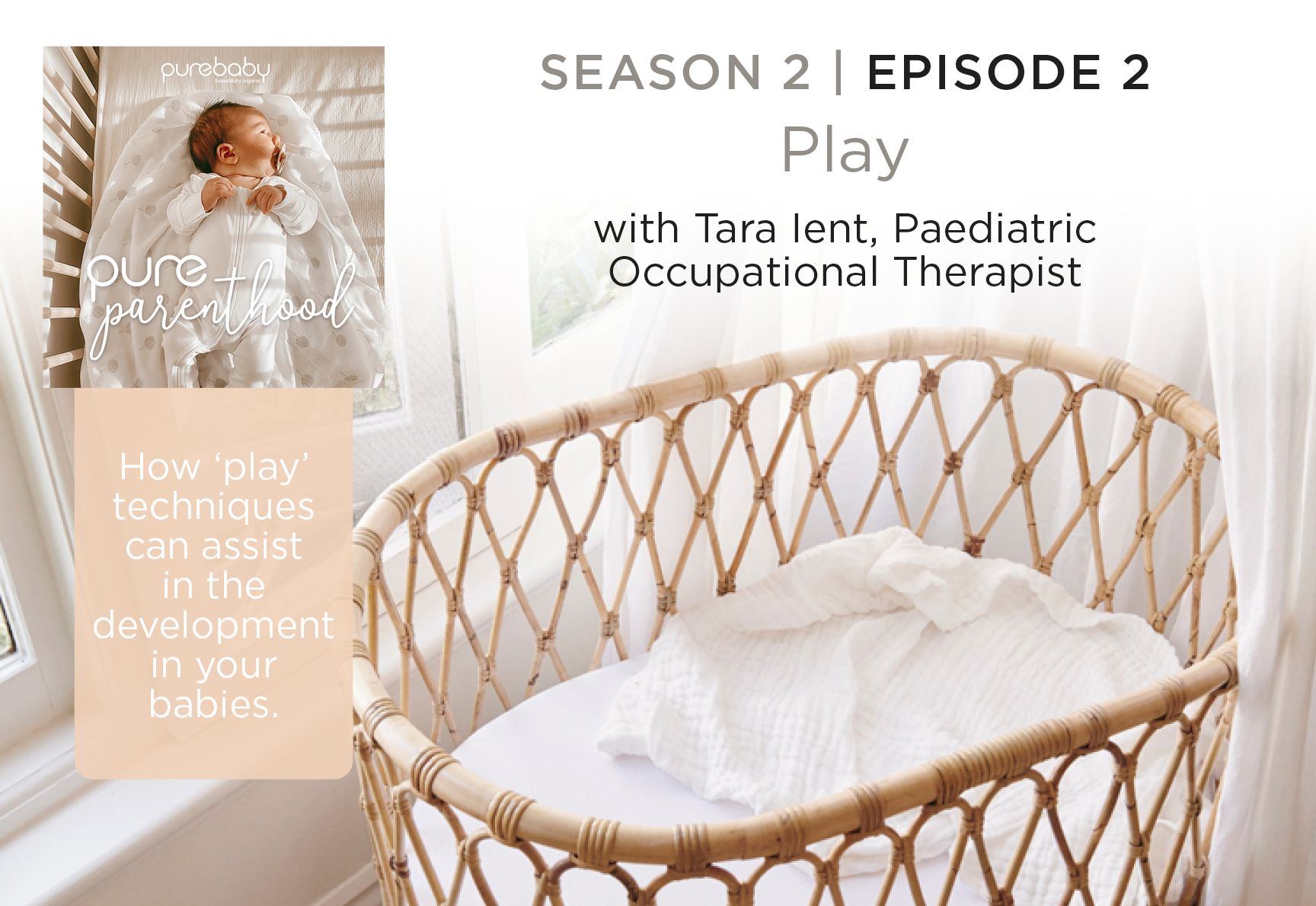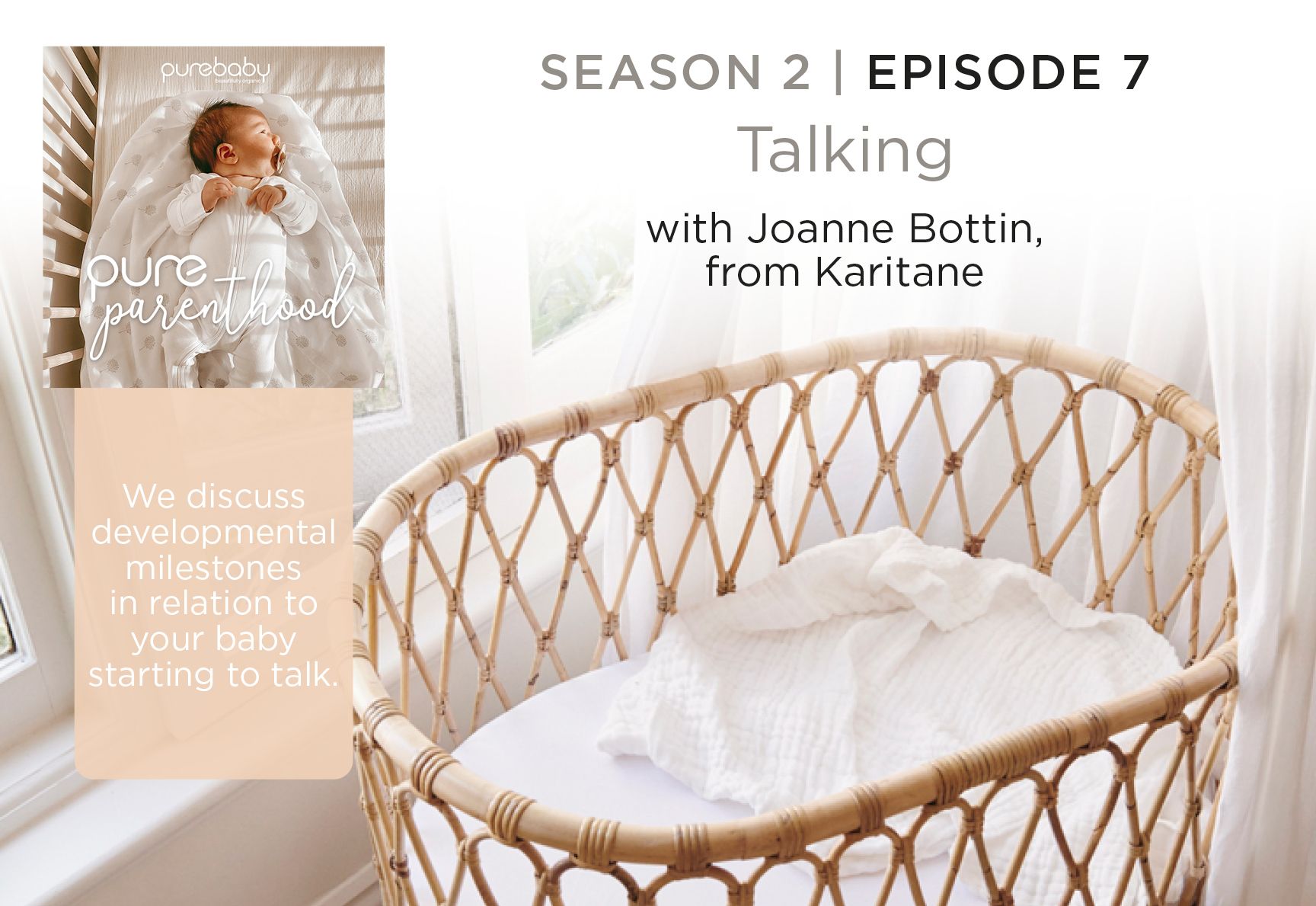
What is Baby Play?
13 min read | 8 March 2021
New In
Essentials
Clothing
Accessories
Shop By Gender
Shop By Size
Collections
Baby
Clothing
Accessories
Shop By Gender
Shop By Size
Collections
Nursery
Care
Play
Kids
Clothing
Accessories
Shop By Gender
Shop By Size
Collections
Care
Play
Gifts
Baby Gifting
Kids Gifting
Shop By Price
Shop By Event
Shop By Gender
Sale
Sale
Shop By Gender
Learn
Education
Resources
Pre-Loved
Rewards
8 min read | 11 April 2021

Communication and language begins during pregnancy. Babies become familiar with the sounds and voices of their family in utero. This starts to build your baby’s brain and the communication process, which are the foundations of talking.
After babies are born, they start to make sounds, vocalisations and will mimic facial expressions almost immediately, adding another layer to their foundation of talking from the womb. Because of this, it is very important to spend time talking to your baby by responding to their changing facial expressions and sounds. Remember, even crying is a form of communication; letting you know they need some help. Be sure to respond with empathy and soothing sounds or words.
‘Goos’ and ‘Gaas’ generally start from around 6 weeks of age and can be seen as your baby’s first words. This is considered talking for your baby, so make sure to be responsive during this time. It is helpful to put down any screens or distractions to ensure you are present with your baby. Respond to your baby like you would to others you are talking to!
As with other aspects of children’s development, each stage builds on what has come before. Speech begins pre-birth and progresses from the time they are born. Here’s a general outline for speech development:
From birth:
Your baby will be making grunting sounds and noises such as ‘oohs’ and ‘ahhs’, as well as crying.
6 months of age:
Your baby will be laughing and copying sounds you make, such as coughing, they are watching everything! Changes will also start to occur in their volume and pitch of the sounds they make.
9-12 months of age:
Sounds start to take on more repetition and begin to resemble words such as Baba, Mama, Dada.
12 months of age:
Your baby will be communicating with intent, meaning they will be pointing at things. They will be very expressive with sounds and trying to mimic speech and words, sometimes it will feel like you’re having a conversation!
15-18 months of age:
By this age words will become clearer and most children will have around 5-10 words they can use appropriately.
2 years of age:
We start to see two words coming together and the formation of first sentences. Words like “Daddy drink” or “Mummy up”. Pronunciation of letters will not be completely developed at this age but are so cute! Sometimes your little one can be frustrated as they develop their communication skills and become annoyed if you haven’t understood them.
3 years of age:
At this age children are still developing their pronunciation of letters but you can start to see sentences forming. Children really start to express themselves through language which is a good thing! Once you see an increase in language your child feels “heard” and you can better understand what they want or are trying to communicate to you.
There are many things parents can do to support their child’s speech development. The most important way to develop your child’s language is by talking to them during pregnancy, as children need to hear conversations.
When your little ones make sounds even as babies, such as talk-back, using inflections and different tones or pitch, these often match their mood. If they are sounding frustrated or grizzly, respond calmly and softly, such as “oh dear, I think you need a cuddle, its ok, I’m right here”. Your tone shows understanding and empathy, but you’re also giving them words to describe their feelings.
Reading books to your little one is essential to the connection and development of their speech. Some books have great repetition of words, so use expression and actions. It will then become familiar to your child and they will join in and anticipate what’s coming next with excitement. It’s recommended to start reading to your little ones from birth.
Be mindful with the use of screens or screen time, as it can have an impact on developing language and communication skills. Babies and children need to see their parent’s faces and expressions when communicating and to see their parents or carers being responsive to their efforts to engage. Missed opportunities to connect in this way can lead to children finding alternative ways to ensure their messages are heard, such as yelling, throwing things or becoming frustrated. Screen use should be limited by both parents and children.
When children are learning to talk, their pronunciation is developing over the first 5 years of life. Be conscious not to correct everything they say exactly how it should be said, as this can reduce their confidence. Try instead to repeat what they are saying in the correct way, for example your little one might say “mummy drink” your response could be “You would like a drink, you must be thirsty! Here’s a nice cold drink”. Repetition of words also helps to build their vocabulary.
When children are learning, they point and grunt to indicate what they want. You can do the same thing by going to what they want, but talking about what you’re doing and using the words in different ways
When you’re out and about, talk about what you are seeing. Describe it, what it looks like, feels like and show the enjoyment. We like to refer to as “delighting in the moment”
This article was written by Joanne Bottin from Karitane, in conjunction with Season two, episode 7 of Purebaby’s podcast, Pure Parenthood.
To learn more about Karitane, visit their website.
Sign up to Pure Love Rewards and get $10 off your first online order, earn points every time you shop and more!